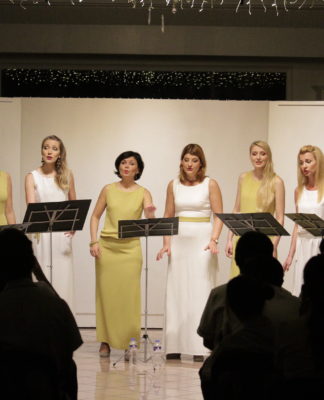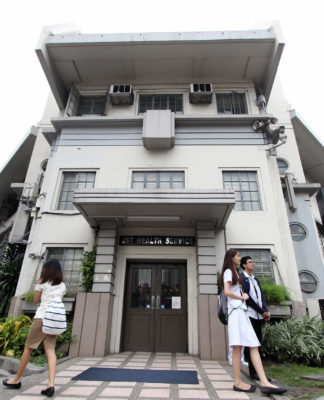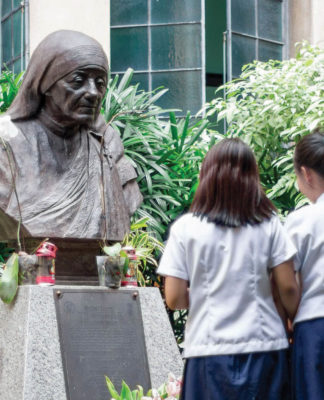THE ECONOMIC “tsunami” raging across the globe could hit UST next school year but the University would be able to meet its obligations to students, faculty, and employees, the Rector has assured.
University officials however said a five-percent tuition increase would be inevitable because of rising operating costs, forthcoming negotiations with the faculty union to increase pay, and the likelihood of a decline in enrollment
“In case the crisis will hit the Philippines, it will impact on our liquidity — our ability to meet our short-term obligations like salaries, benefits of faculty and (other) employees, and the continuation of our projects,” Rector Fr. Rolando de la Rosa, O.P. told the Varsitarian.
The proposed five percent tuition increase for next school year, expected to shore up the University’s finances, is being opposed by college student councils.
The tuition hike was generally kept below last year’s average inflation rate of 9.3 percent.
De la Rosa said the number of enrollees next school year would be crucial.
“If ever there will be a decrease in enrolment, we would have to rethink our manpower system,” De la Rosa said.
The crisis, which began with the collapse of financial markets in the United States and Europe last year, has slowed down economic activity worldwide, resulting in weaker consumption and layoffs (see related story on page 2).
The Philippines is not expected to fall into recession this year but export industries would be hit hard and the growth in remittances from overseas workers could slow down, economists have said.
University Registrar Rodolfo Clavio said enrollment normally declines in the second semester when students get debarred.
But the slowdown could come as early as the first semester of the next academic year because of economic conditions.
“Most of our students come from the middle class. If remittances will not be sufficient, students cannot come (to school) and they encounter problems,” Clavio said.
Academic Year (AY) 2008-2009 began with 40,627 students, up from 38,253 the previous year. This semester, enrollment went down to 39,820, although significantly higher than the total 34,326 in the second semester of AY 2007-2008.
No way but up
Marissa Gonzales, UST’s assistant chief accountant, said the administration had proposed a seven-percent tuition hike, but student leaders asked that the increase be cut to five percent.
UST Comptroller Diomedes Yadao said utility bills and maintenance of equipment and vehicles, particularly UST buses, had to be considered. He noted that water rates have gone up by P2 per cubic meter.
Consumer prices went up by 9.3 percent in 2008, faster than the 2.8 percent inflation rate a year earlier.
Aside from tuition, Yadao said the energy fee would be increased to P1,200 from P1,000, and the drug testing fee to P328 from P280.
The highest increases are for guidance and counselling and community services, which will go up by around half.
The library fee will also hiked to increase the subscription of magazines and journals from other countries.
A new fee will also be introduced next school year — the learning management system fee for the improvement of the UST “online blackboard” or E-Leap. Each student will be charged an additional P65.
Faculty concerns
UST Faculty Union chief Gil Gamilla said that if he had his way, the tuition increase would be “more than five percent.”
“(In coming up with the percentage of tuition increase), you have to consider the value of money today,” Gamilla said. “The faculty members have been tightening their belts.”
Gamilla said the union would not agree to layoffs. “We will not allow any layoffs only because of fewer enrollees. In that case, the University can only reduce the teaching loads (of the faculty),” he said.
The reduction of loads is the only way the salary of a professor can be cut, Gamilla explained.
By law, 70 percent of tuition increases goes to the salaries of faculty. Twenty percent should go to the upgrade of school facilities, while 10 percent goes to return on investment.
The Rector said the University has shelled out P390 million in back wages to professors as a result of a two-year delay in collective bargaining negotiations. The new collective bargaining agreement (CBA), however, is only for 2006 to 2009 and negotiators will have to go back to the table this year.
“As of now, we are able to maintain (the payment of back wages and benefits to the faculty),” De la Rosa said.
But the Rector said deans should guard against unnecessarily promoting faculty members who do not have master’s or doctorate degrees by adding too many points in their performance evaluations.
“We are constrained in a way to promote faculty members because of the provisions of the CBA, because the moment they receive a certain percentage in their evaluation, automatically they are promoted regardless if they have master’s or doctorate degrees or not,” the Rector explained.
Gamilla said faculty members were looking forward to the next round of CBA negotiations but “The most important thing as of now is that we have a job.”
No to increase
Ahead of consultations with the administration, students are crying foul over the looming tuition increase.
The student councils of the Faculties of Civil Law and Medicine and Surgery have passed separate position papers addressed to Vice Rector for Finance Fr. Manuel Roux, O.P., opposing increases in tuition and miscellaneous fees.
The Civil Law Student Council said there should be no increase in any of the fees, and that certain fees should even be eliminated. It cited the athletic fee, because “(the Faculty) does not use any of the sports facilities of the University; it does not have students taking up Physical Education classes, nor does it have athletes in any field of sport that the University is participating.”
It also opposed the eight percent increase in tuition per unit for Civil Law, which is higher than the five percent general increase.
“Due to the current financial crisis, we believe that now is not the time for a tuition increase,” said the paper dated Feb. 7.
Medicine students, on the other hand, bewailed the proposed 11 percent increase in their tuition.
“We would like to be clarified what the information development fee is about and why it merits such an amount,” the Medicine Student Council said.



















